Compliance
Regulation of the petroleum and gas industry in Queensland
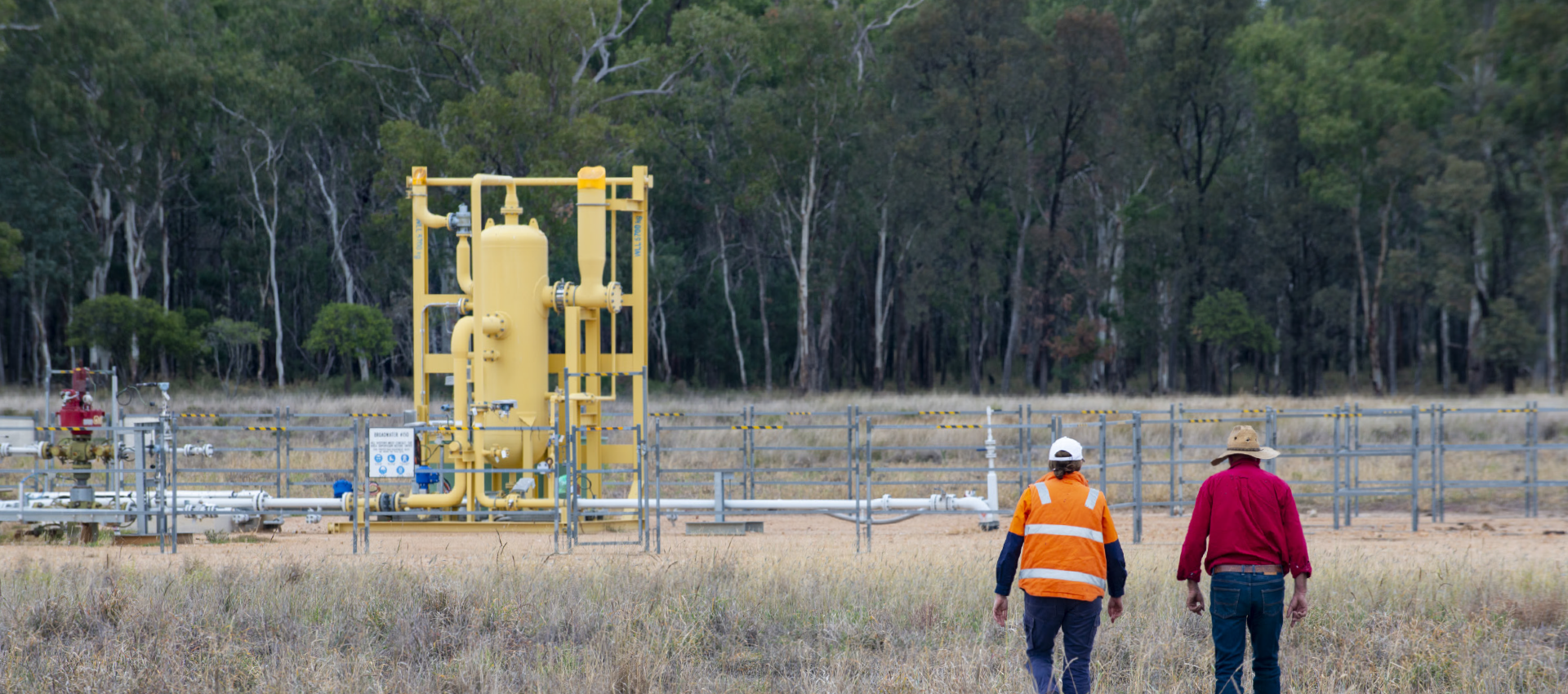
Regulators have a range of compliance and enforcement options to address non-performance across the petroleum and gas industry.
Petroleum and gas activities in Queensland are regulated by a number of Queensland Government agencies, including:
- Department of Resources (Resources) with respect to tenure and land access;
- Resources Safety and Health Queensland (RSHQ) which is an independent statutory body that regulates the safe operation of the resources sector;
- The Department of Environment and Science (DES) which protects and manages the State’s environment and natural resources;
- The Department of State Development, Infrastructure, Local Government and Planning (DSDILGP) which administers the Regional Planning Interests Act 2014.
These regulating agencies manage and monitor risk through a range of assessment, compliance, investigation and enforcement activities.
Department of Environment and Science
As part of its compliance planning, DES prepares and publishes its Annual Strategic Compliance Priorities. During FY21, one of the strategic focus areas targeted CSG industry activities in relation to storage, management, and treatment of associated water, the re-injection of groundwater, management of salt and brine waste, hydraulic fracture stimulation and air quality monitoring.
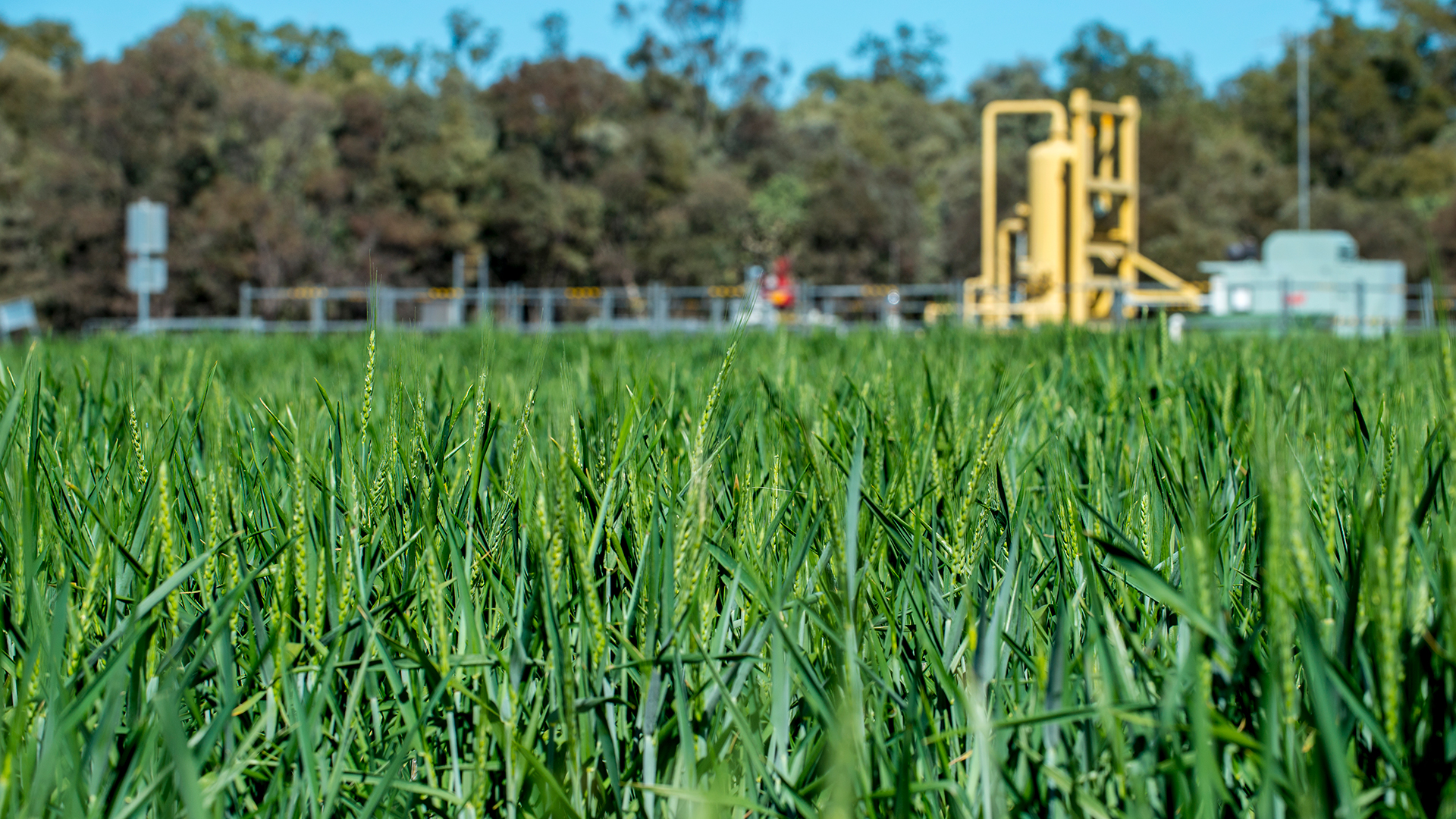
The Department of Environment and Science’s approach to ensuring compliance with its legislation includes both reactive (in response to a complaint or incident) and proactive (planned activities including set clear expectations, publishing guidance material and supporting information) actions, which include:
- educating individuals, industry and governments about the laws and how to comply with them encourage voluntary compliance with obligations
- monitoring compliance
- rewarding good performers
- responding to breaches of the legislation with consistent and proportionate enforcement action.
It is the responsibility of environmental licence or permit holders to comply with the strong environmental standards and obligations required by law and – where a potential environmental risk has been identified – to have appropriate and effective control measures in place to minimise the potential for environmental harm.
Drilling of wells and completion activities may result in community reports about noise or light intrusion (environmental nuisance). However, these activities are often subject of a CCA or alternative arrangements between the Environmental Authority (EA) holder and landholders.
Following completion of construction work for major infrastructure items, reports are more likely to relate to associated water released from failed water pipeline valves, vents and well head separators and seals. As resource companies have identified items at higher risk of failure, strategies have been applied to replace those items or implement improved servicing and maintenance procedures to minimise this risk.
Enforcement measures taken by Department of Environment and Science since FY11
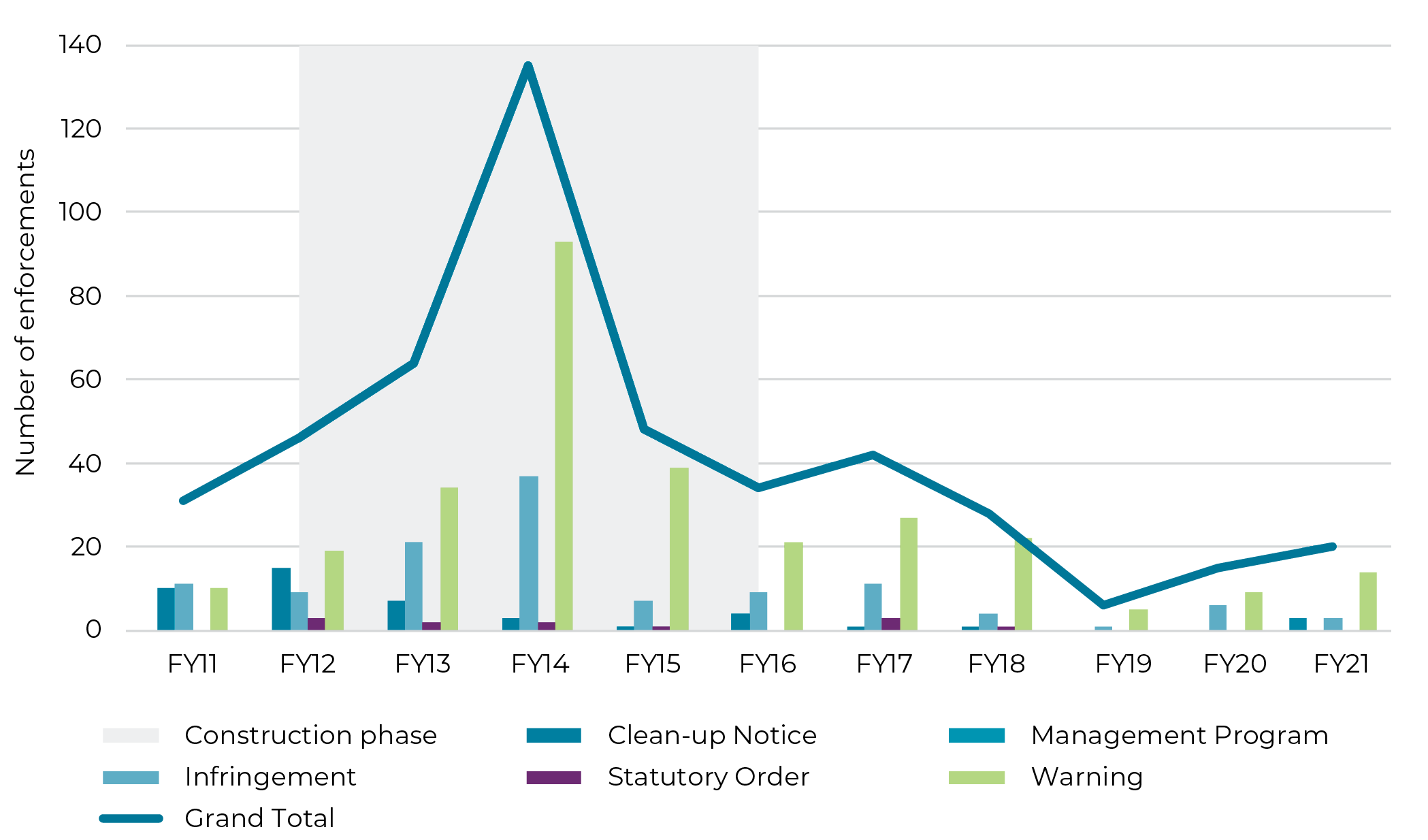
The highest frequency of enforcement measures being applied coincides with the peak of industry construction activity (see graph above), and correspondingly the peak of incident reporting during FY13 (see graph below). The overall decline in both reports/notifications and enforcements can be attributed to the progression from construction to the commissioning and start-up phase for the CSG upstream facilities of the major LNG export consortiums to the operational phase.
Community reports and resource company notification
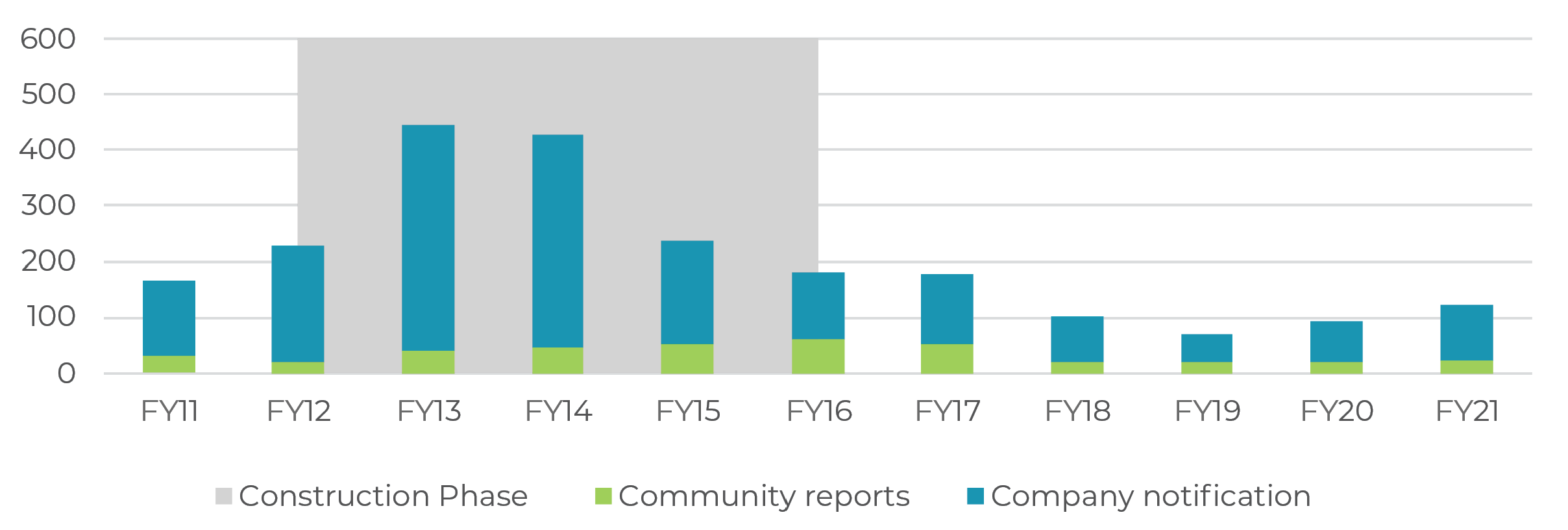
Department of Resources
The Department of Resources administers a range of legislation that forms part of the regulatory framework that manages the use of – and access to – Queensland’s mineral and energy resources. The Engagement and Compliance Unit (ECU), a business unit of Resources, deals directly with enquiries and complaints made about mineral and energy resource activities in Queensland, including petroleum and gas activities. A total of 2,181 petroleum and gas enquiries and complaints were received by ECU over the last nine years.
In FY21, the ECU received 172 petroleum and gas enquiries and complaints, bringing the total petroleum and gas enquiries and complaints received by ECU over the last nine years to 2,181. The most common subjects stemming from enquiries over the last two financial years were governance and CSG operations. The most common subjects in complaints were related to CSG operations and land. As of 30 June 2021, there were six active enquiries and complaints, which were received in FY21 and being dealt with in the relevant timeframes attached to their priority and complexity. The increase in enquiry and complaint activity in FY21 is directly linked to the increase of deviated drilling occurring in the Surat Basin30 as part of production leases. To provide further clarification for tenure holders and landholders regarding rights and responsibilities, Resources published a factsheet in August 2021; Considerations when accessing private land to carry out directional drilling on adjacent land. The factsheet sets out the regulatory framework for resource authority holders to access private land to carry out directional drilling activities on adjacent land and landholder rights that apply in that scenario.
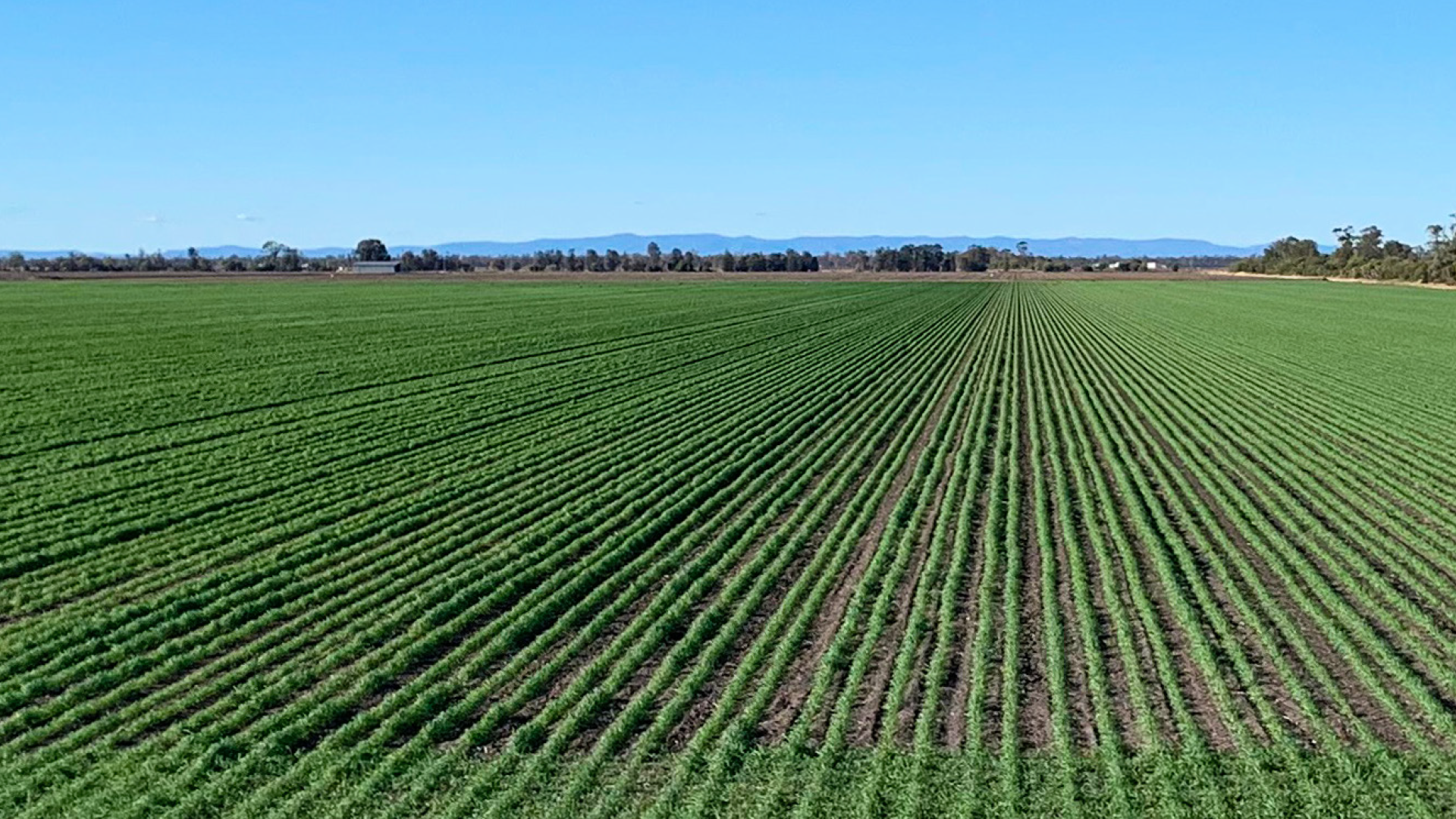
Enquiries received by Georesources’ Engagement and Compliance Unit
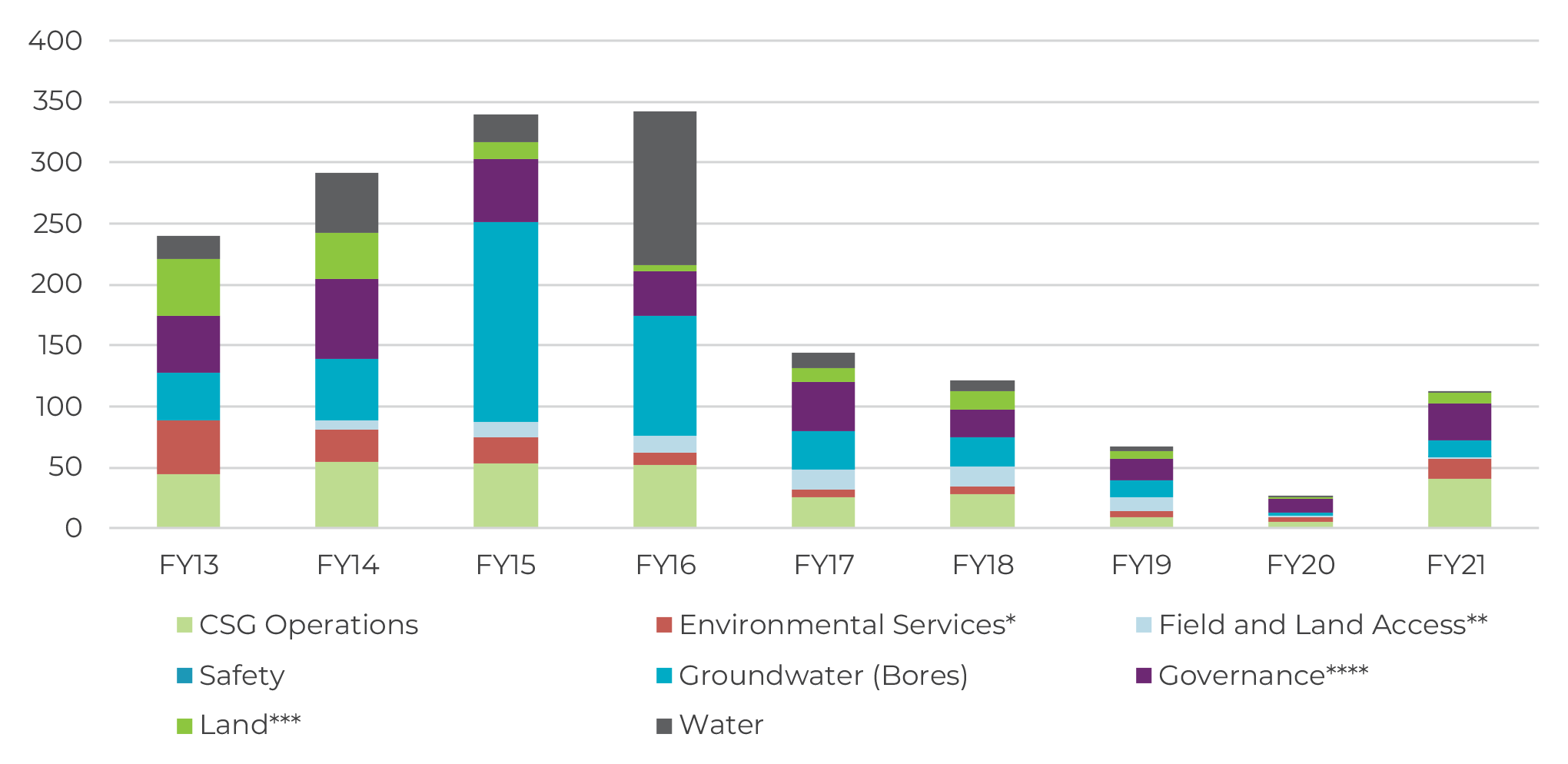
Complaints received by Georesources’ Engagement and Compliance Unit

* Environmental Services: referrals to Department of Environment and Science
** Field and Land Access: includes property entry and access issues and the land access code
*** Land: includes cultural heritage, erosion and vegetation clearing
**** Governance: includes, but is not limited to, matters concerning legislation, regulatory framework, government initiatives, public reports and communications.
It should be noted the department managed water during the period of reporting as the Department of Natural Resources, Mines and Energy. Following machinery of government changes in late 2020, water is now managed by the Department of Regional Development, Manufacturing and Water.
Alternative avenues for petroleum and gas related enquiries and complaints
Stakeholder awareness and understanding of the petroleum and gas industry has also matured, with communities and industry becoming better informed through the effective delivery of engagement and compliance initiatives by the Georesources Engagement and Compliance Unit, other government agencies, private organisations, and the petroleum and gas industry itself.
As a result, information is now more readily available and stakeholders are better informed, consulted and supported regarding petroleum and gas activities. Additionally, industry and community now have better access to alternative dispute resolution and enquiry services through the Commission and the Officer of the Land Access Ombudsman (LAO).
Petroleum and Gas Inspectorate
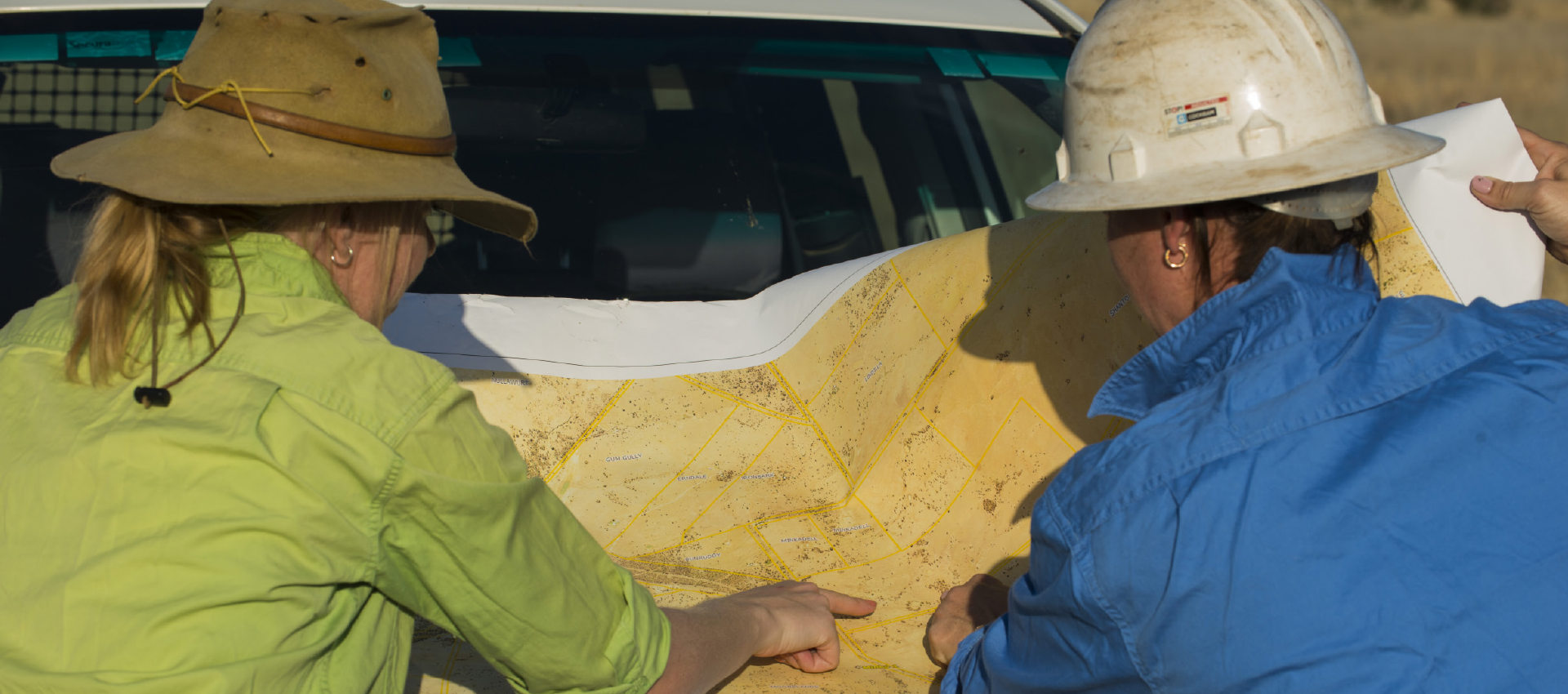
The Petroleum and Gas Inspectorate (the Inspectorate) is part of Resources Safety and Health Queensland (RSHQ), an independent statutory authority. The Inspectorate carries out a compliance assurance program each year that covers aspects of safety and health in upstream operations. RSHQ publishes quarterly compliance data on the number of audits, inspections and complaint investigations that have been conducted across the petroleum, explosives, mining and quarrying sectors.
RSHQ and the Inspectorate encourage open reporting and wish to facilitate a reporting culture to help control hazards and reduce risks. Incident reporting, especially for high potential incidents, can help ensure early warning signals of impending incidents are captured and disseminated to industry. Additionally, it will provide the best opportunity to identify hazards before they cause harm and ensure they are effectively controlled.
Petroleum and gas compliance data

During FY21 period, 20 of the 78 audits were conducted as part of the petroleum well regulation. The focus of these audits was grouped into the following high-risk areas; Leak management (8 audits), abandonment (8 audits), hydraulic fracturing (3 audits) and well integrity management systems (1 audit).
CSG well specific compliance data
Overview of CSG well compliance under the construction and abandonment code of practice through FY18, FY19, FY20 and FY21
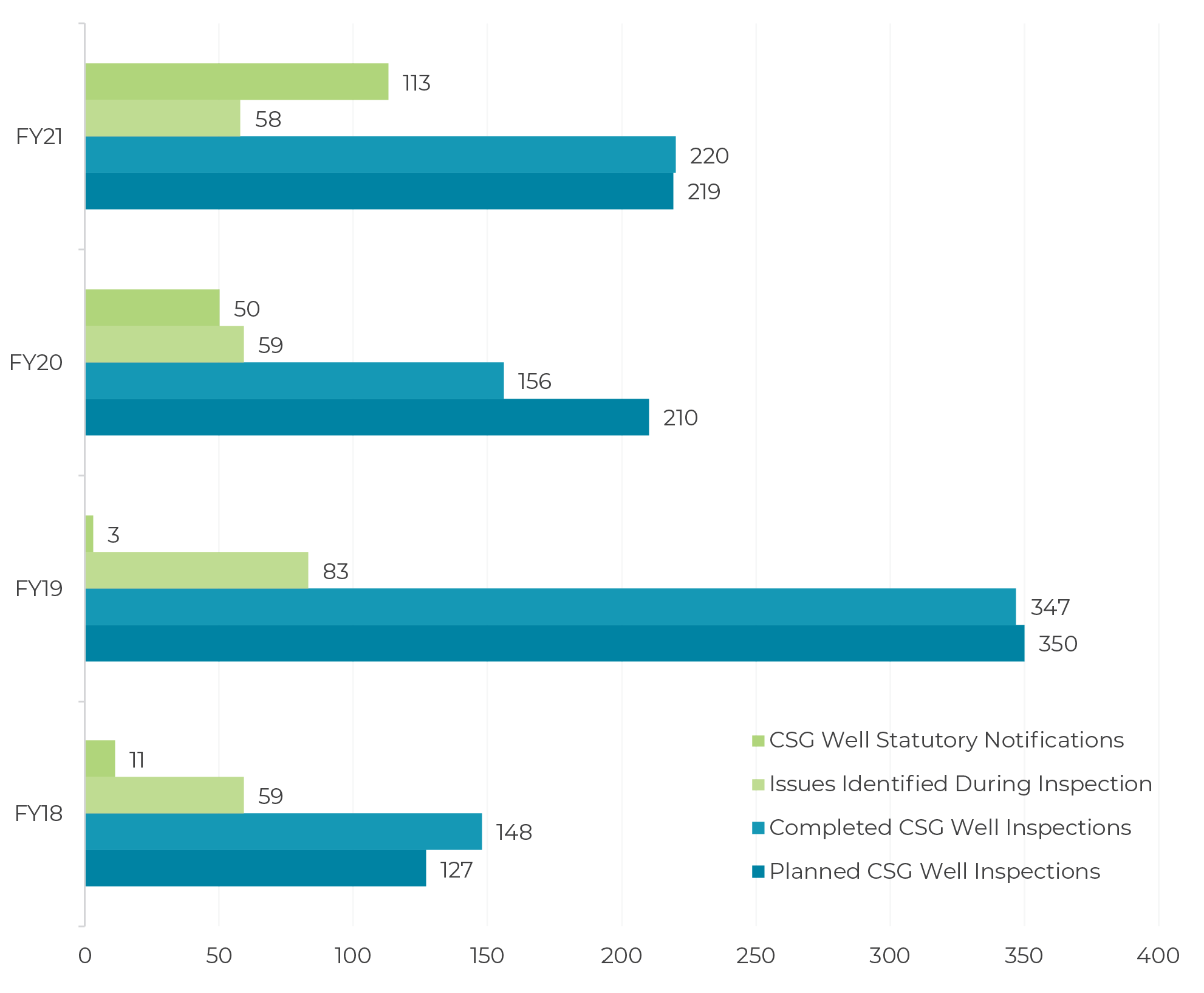
Number of CSG Well Statutory Notifications
During FY21, there were 37 notifications for failure to meet cementing objectives and 76 well integrity notifications, which are a new requirement in the latest version of the construction and abandonment code of practice. An increase in the number of well-related notifications is not seen as an issue in itself but as a positive that industry is identifying and reporting incidents.
Number of Completed CSG Well Inspections
During FY21, issues ranged from areas for improvement around general housekeeping and signage through to leaks on 12 of the 220 CSG wells inspected, the requirement for additional monitoring under the operator’s well integrity and leak management systems, and remediation to rectify non-compliant equipment on a very small number of wells.
Land Access Ombudsman
The Land Access Ombudsman (LAO) opened in September 2018 with specific functions to investigate alleged breaches of Conduct and Compensation Agreements (CCAs), Make Good Agreements (MGAs) and make practical recommendations to resolve disputes.
The table below highlights the number of enquiries related to all resource activities (petroleum and gas related activities are shown in brackets), that were received by the LAO since operation commenced on 14 September 2018, up to the end of FY21.
LAO Enquiries Received
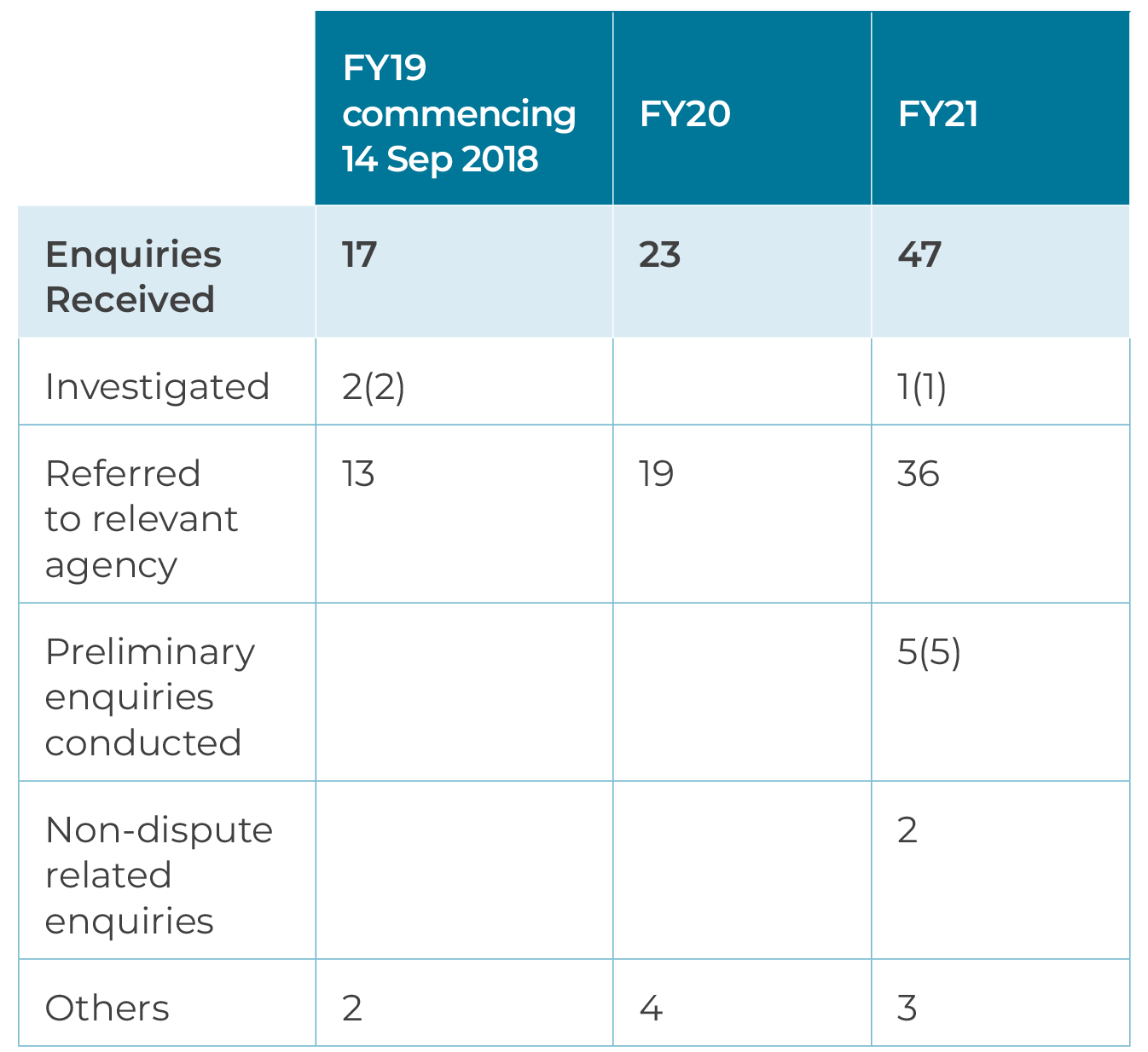
In FY21, 6 of the enquiries about a possible dispute referral received concerned petroleum and gas related activities. Of these, 1 was investigated and 5 had preliminary enquiries conducted.
Themes of Enquiries Received by the LAO
FY19 – investigated dispute topics included:
- biosecurity concerns (mainly weed and washdown compliance);
- outstanding rehabilitation or rectification works;
- rubbish and used materials left on property without the landholder’s consent; and
- gate and access conditions.
FY20 – themes in dispute that were out of LAO’s jurisdiction included:
- being related to resource industry activity on rural land, but there being no CCA or MGA in place;
- disputes over use/ownership of easements and bodies of water; and
- complaints about telecommunications workers accessing private land.
FY21 – investigated disputes included:
- transfer of a petroleum licence, concerns about biosecurity and public liability insurance.
Find out more
For additional information, insights and data, please download a PDF.
📄
Download topic PDF
Compliance
📑
Download full report PDF
Shared Landscapes – Industry Trends
